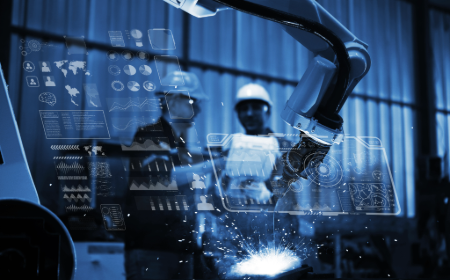AI can predict health deterioration in hospital patients – Earth.com
Artificial Intelligence (AI) is no longer just a tool for automating tasks but has evolved into a pivotal aid in healthcare, significantly enhancing collaboration between physicians and nurses. This leap in healthcare technology is exemplified by a recent study that explores AI’s role not merely as an assistant but as a critical facilitator of efficient and effective patient care.
Stanford Medicine conducted a study that showcases an AI-based model currently in use at Stanford Hospital. This model is designed to predict patient deterioration and notify both physicians and nurses. Thereby, it fosters timely and effective clinical interventions.
Revolutionizing patient care with AI
Study senior author Dr. Ron Li, a clinical associate professor of medicine and medical informatics director, illustrates the core functionality of the AI system.
Developed in collaboration with Dr. Robert Gallo, an informatics postdoctoral scholar, and other key team members, this AI model significantly reduces the likelihood of patient deterioration escalating to critical levels that require intensive care.
“The alert system helps clinicians connect more efficiently and effectively as well as intervene to prevent patients from deteriorating and landing in the intensive care unit,” noted Dr. Li.
AI’s patient deterioration prediction
The AI model operates by continuously monitoring various patient data points. These include vital signs, electronic health records, and laboratory results.
Subsequently, it updates this data roughly every 15 minutes to calculate a risk score for patient deterioration. When a patient’s data suggests potential health decline, the model promptly alerts the care team, enabling immediate and coordinated action.
“This model is powered by AI, but the action it triggers, the intervention, is essentially a conversation that otherwise may not have happened,” noted Dr. Lisa Shieh, a clinical professor of medicine involved in the study.
AI system in patient monitoring and care
The benefits of such an AI system in a hospital setting are manifold. Beyond monitoring patient data, the model also serves to standardize and enhance communication among medical staff. This is crucial in the fast-paced, often unpredictable hospital environment.
“Once the alert comes into the nurse and physician simultaneously, it initiates a conversation about what the patient needs to ensure they don’t decline to the point of requiring a transfer to the ICU,” said Jerri Westphal, the nursing informatics manager.
AI’s role in healthcare improvement
The implementation and evaluation of this AI model involved significant adjustments and direct engagement from the nursing team.
“We adjusted the model to focus on predicting ICU transfers and other indicators of health decline. We wanted to ensure the nursing team was heavily involved and felt empowered to initiate conversations with physicians about adjusting a patient’s care,” said Margaret Smith, the director of operations for primary care and population health.
The evaluation of the AI model at Stanford Hospital showed a significant reduction in health deterioration events, with a 10.4% decrease among patients flagged as high-risk by the system.
This decline indicates that the AI’s predictive capabilities are effectively identifying patients who are most likely to require urgent medical attention, thereby allowing medical staff to intervene proactively.
The substantial decrease in such events confirms that the model operates successfully in practical, real-world healthcare settings, enhancing patient outcomes and demonstrating the tangible benefits of integrating AI technology into hospital care protocols.
Challenges and advancing AI in healthcare
Although AI has significantly improved hospital operations, concerns like alert fatigue remain since not all alerts indicate a real decline. Nonetheless, the accuracy and consequential discussions it provokes are deemed sufficient to justify its use.
“With that said, we want to improve the accuracy; you need to do that to improve trust. That’s what we’re working on now,” said Dr. Li. This pioneering integration of AI in healthcare exemplifies the potential for technology to not only support but significantly enhance patient care through improved collaboration and communication among medical professionals.
As AI technology continues to evolve, its integration into healthcare systems promises even greater advancements in patient care and medical outcomes.
The full study was published in the journal JAMA Internal Medicine
—–
Like what you read? Subscribe to our newsletter for engaging articles, exclusive content, and the latest updates.
Check us out on EarthSnap, a free app brought to you by Eric Ralls and Earth.com.
—–













